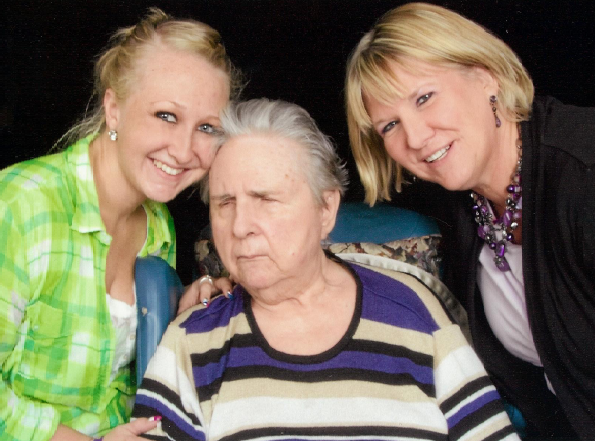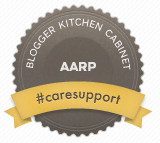Really…How Can We Be Family? We Care So Differently
Really…How Can We Be Family?
We Care So Differently
This is a picture of my daughter Danielle, my Mother and myself. I can honestly say the three of us all have a similar care style. Compassionate, loving, organized and person centered. But in truth, we were not always this way.
Throughout life our perceptions and roles change. I think at our core Mom, Danielle and I have been and most likely will always be compassionate, loving and organized, but at different stages of our lives, those characteristic rise and fall depending on what else is going on in our life.
For example there was a period in my life when organization took the top priority. It gave me a sense of control and feeling important… being the one to get things done! Of course at the time I had know idea this is why being organized was important to me.
Back in the day, it built a sense of confidence I didn’t know I was lacking, and surely few others thought it was lacking. I was the one in charge… Intimidating some would even call me. I could never understand that. Me intimidating? NO, I don’t think so.
Well, looking in the rear view mirror I can easily see how some would think that. I was like a bulldozer plowing through one task and then the next….Click, Click Click. No time to waste. So much to do and not enough time to accomplish them all without strict control and structure. Yes, that was a must for me.
Of course I would give people the opportunity to help…well tell them, assign them what to do and how to do it. Perfection was very important to me at the time. I wanted others to get it right according to my play book and I also wanted their approval. I needed their approval to feel valued, but again at the time didn’t have a clue that was what my need for control was about.
It was later in life I realized I really was in control of very little. My need to grasp a hold of it when I could, really wasn’t near as beneficial as I thought it was. And so after many years of being a rigid task manager, I’ve changed.
I’ve let go and I am much more open to letting others be part of, and contributing in a fashion that is comfortable to them.
Wow was that a shift! Many didn’t understand why I changed…or did I? Some sat back waiting and watching for the trap… It had to be a trap. Of course it was a trap. A control freak doesn’t change overnight! Yes, for sure something was up and most thought it was some type of “Covert Sting Operation.”
Looking back it was funny to see the reactions. I explained my reason for change to everyone once and then let that go to. No more did I feel a need to defend my “honor.” They would either believe or not. Boy was that nice too… no longer taking responsibility for others reactions, perceptions or actions.
Eventually people came around and saw that I had really changed and I, yes I, could now accept help. I didn’t have to be in control, the fixer of all. I no longer look at life as needing to be perfect. It just is and in my new relaxed state I have found every aspect of life is much more enjoyable.
So next time you ask that question…
“Are we really related?”
Step back and think about what is really going on and why. Believe in the goodness of people, knowing everyone is capable to change at some level. Don’t look for the worst, as you will find it. Instead, search for the joy in every moment before. It is there. You have to look to find what it is you are looking for. Laugh in sickness and in health. Love without worrying that it might not last, and just be grateful it is before you now. Care for others as you yourself would want to be cared for. Remember, to slow down and think of how you are helping.
Are you just getting things done, or are you assisting them in feeling engaged and purposeful even if it takes a little bit more time.
Remember, how would you feel…
if everything was done for you, without your input?
I’d love to hear your thoughts especially now when times can get a bit haired during the holiday season.
Do you have that person in your family
that doesn’t seem to fit in?
Or is that person you
and you just have not recognized it like?
I am a member of AARP’s blogger kitchen cabinet on caregiving issues. All opinions are my own Lori La Bey.





beautiful Picture Lori Merry Christmas and a Happy New Year to you and your Family. Big hug to your Mom Lori
Thanks Bakhus
Have a wonderful holiday season
Lori
Reblogged this on lava kafle kathmandu nepal.
Lori….great article. I’m finding as I am aging that I am having a similar response to life…and it feels good!
Thanks Kim It sure can be freeing! Enjoy your holidays
Lori
Peacefulness Peacefulness is being calm inside. Take time for daily reflection and gratitude. Solve conflicts so everyone wins. Be a peacemaker. Peace is giving up the love of power for the power of love. Peace in the world begins with peace in your heart. Perseverance Perseverance is being steadfast and persistent. You commit to your goals and overcome obstacles, no matter how long it takes. When you persevere, you don’t give up…you keep going. Like a strong ship in a storm, you don’t become battered or blown off course. You just ride the waves. Purposefulness Being purposeful is having a clear focus. Begin with a vision for what you want to accomplish, and concentrate on your goals. Do one thing at a time, without scattering your energies. Some people let things happen. When you are purposeful, you make things happen. Reliability Reliability means that others can depend on you. You keep your commitments and give your best to every job. You are responsible. You don’t forget, and you don’t need to be reminded. Other people can relax knowing things are in your reliable hands. Respect We show respect by speaking and acting with courtesy. We treat others with dignity and honor the rules of our family, school and nation. Respect yourself, and others will respect you. Responsibility Being responsible means others can trust you to do things with excellence. You accept accountability for your actions. When you make a mistake, you offer amends instead of excuses. Responsibility is the ability to respond ably and to make smart choices. Self-discipline Self-discipline means self-control. It is doing what you really want to do, rather than being tossed around by your feelings like a leaf in the wind. You act instead of react. You get things done in an orderly and efficient way. With self-discipline, you take charge of yourself.
Nice thoughts to guide people. Thank you for your comments
Lori
What most inspires a child to grow up caring about others is the caring that the child receives. That nurturing is itself a perfect role model for children. Experts point out that when children feel they have a secure base at home, they’re more likely to venture out and pay attention to others. It’s when they feel deprived of love and nurturing that they focus too much on themselves and their own needs.
Thanks for writing. I really liked your comment
Lori
When we think about the last part of our own or someone else’s life, consider these questions: What makes life worth living? What would make it definitely not worth living? What might at first seem like too much to put up with, but then might seem manageable after getting used to the situation and learning how to deal with it? If I knew life was coming to an end, what would be comforting and make dying feel safe? What, in that situation, would I most want to avoid? Some matters to consider would be: being able to talk with people, activity, physical comfort, alertness, the burden of care on others, being at home (or not being there), how much distress it would be worth in order to live another month, what medical procedures are not worth enduring, what I think is the best way for a person to die, how important it is to be in control of how one lives and how one dies, whose opinion should be sought in making choices about end of life care. One especially important matter is to complete the Advance Health Care Directive for both the person who is ill and the caregiver, so that there is an official spokesperson when one is too sick or too confused to speak for him/herself.
HI Kristine
Thanks for your comments. You have given us a lot to think about
Lori
What most inspires a child to grow up caring about others is the caring that the child receives. That nurturing is itself a perfect role model for children. Experts point out that when children feel they have a secure base at home, they’re more likely to venture out and pay attention to others. It’s when they feel deprived of love and nurturing that they focus too much on themselves and their own needs.
HI Reggie
Thanks for sharing your thoughts
Lori
When we think about the last part of our own or someone else’s life, consider these questions: What makes life worth living? What would make it definitely not worth living? What might at first seem like too much to put up with, but then might seem manageable after getting used to the situation and learning how to deal with it? If I knew life was coming to an end, what would be comforting and make dying feel safe? What, in that situation, would I most want to avoid? Some matters to consider would be: being able to talk with people, activity, physical comfort, alertness, the burden of care on others, being at home (or not being there), how much distress it would be worth in order to live another month, what medical procedures are not worth enduring, what I think is the best way for a person to die, how important it is to be in control of how one lives and how one dies, whose opinion should be sought in making choices about end of life care. One especially important matter is to complete the Advance Health Care Directive for both the person who is ill and the caregiver, so that there is an official spokesperson when one is too sick or too confused to speak for him/herself.
Good information for us to think about!